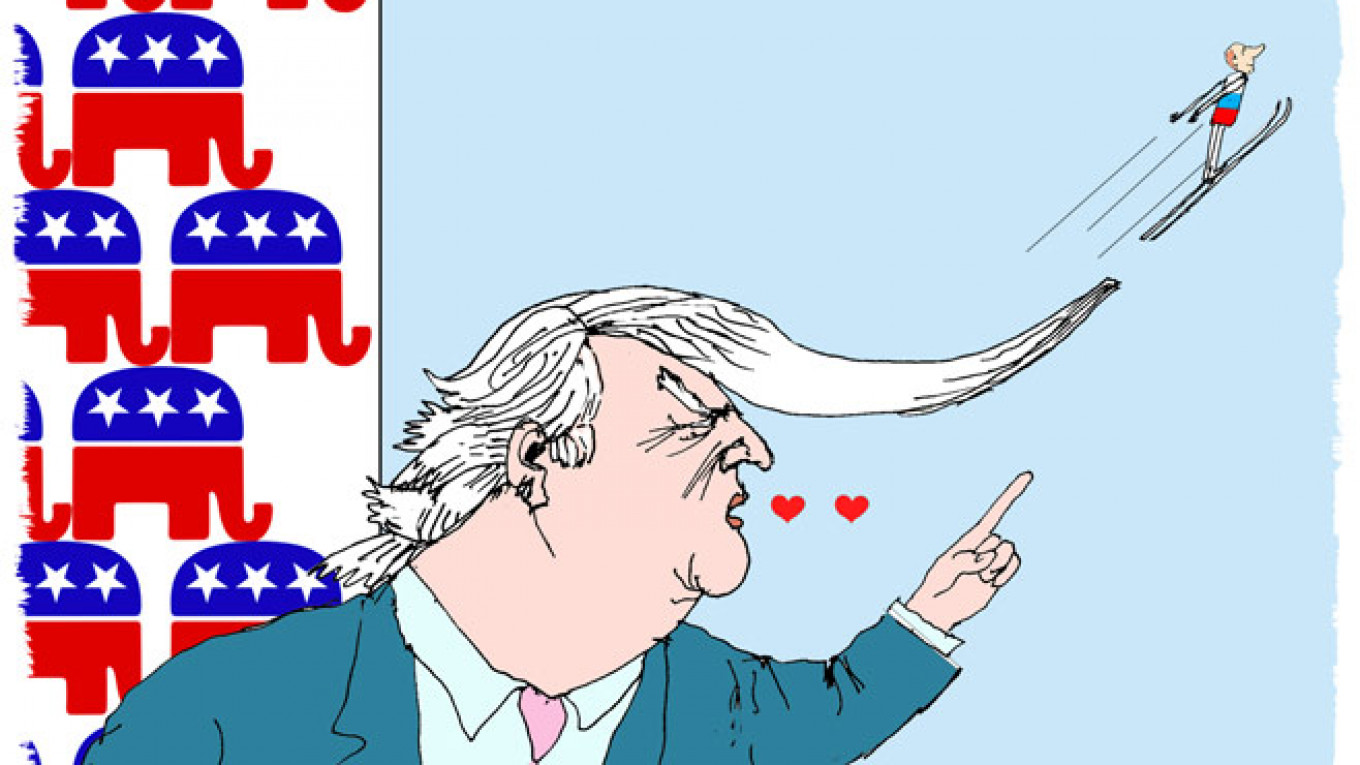Donald Trump, for all his gaffes and seemingly threadbare grasp of detail, remains the frontrunner for the Republican nomination in the upcoming U.S. presidential elections. As a U.S. resident, if not voter, this is something that I confess amazes and horrifies me, although there is still a long way to go until the election.
And yet perhaps it should not be so surprising. After all, there have been other leaders who have won power not just in spite of proudly and defiantly breaking the mold of the mainstream professional politician, but because of it. Italy had its Silvio Berlusconi, Turkey has its Recep Erdogan — and Russia has its Vladimir Putin.
At first glance, the coolly austere, judo master ex-spy and the bombastic — positively braggadocious — golf-playing property tycoon may seem to have little in common, even if Trump thinks he'd "get along very well with Vladimir Putin."
However, beneath the skin there are some striking parallels that say something rather broader. Both explicitly present themselves not as politicians but as practical men. Indeed, much of their appeal is precisely that they are disconnected from what is regarded as the "political class."
Both espouse a nationalism and a fervent belief in the exceptionalism of their homeland. Admittedly, there is a difference. Putin is an avowed proponent of Russia as a multi-ethnic state albeit one shaped by Russian values, whereas Trump makes no bones about his feelings, whether talking about Mexican "rapists" or implicitly accepting the falsehood that U.S. President Barack Obama is a Muslim.
However, in terms of the bases with which they connect, there is a distinctly similar lowest-common-denominator racism at work.
Meanwhile, both believe that a strong nation is a well-armed one. Putin has poured resources into a massive (and increasingly unaffordable) rearmament program, while Trump pledges to make the American military "so big, so strong and so great, so powerful that we're never going to have to use it."
While both clearly love the military, neither served. Putin avoided conscription through going to university and then joining the KGB, while Trump relied on a medical exemption. On the other hand, Trump reportedly believes that having spent five years as a child in military school gives him "more training militarily than a lot of the guys that go into the military." I suspect few real soldiers would agree.
For both of them, though, the myth matters more than the man behind it. Trump is an avowed cultivator of his "brand" — indeed, it is a central asset in his business empire. But Putin no less has built for himself a composite persona — incisive chief executive, macho adventurer, patriot and animal-lover — that has far more traction on the public imagination than whatever may truly be found behind the high and private walls of his Novo-Ogaryovo mansion.
His economy in decline, largely because of poor investment decisions in the 2000s and poor geopolitical decisions since then, Putin is nonetheless as popular as ever. One can cavil about the exact numbers, the reliability of the polls, but it is impossible to challenge the strength of his personal grip on Russians' respect, if not necessarily their affection.
Likewise, every time Trump makes another blunder or casually offends another section of society, his popularity seems to spike, not slump. Ironically, they have become part of his brand, a sign that he is not the product of a focus-grouped, politically correct, risk-averse modern political campaign.
Unlike Putin, Trump is probably not going to be president. Even if he wins the Republican nomination, the electoral arithmetic alone will probably ensure that. The fact that he is as credible a candidate for the nomination as he still is, though, demonstrates that he — like Putin — does speak to the hearts of at least a reasonable fraction of his countrymen.
The popularity of neither man can simply be attributed to the power of propaganda or spin. Ultimately, it is because both fulfill deeply held needs within their respective countries.
Trump and Putin both offer simple solutions to complex, intractable problems. They offer a refreshing, outspoken, macho alternative to tainted political classes regarded as bland, ineffectual and corrupt.
They look out at people's feeling uncertain about their place in a world they once felt was theirs, and tell them that they are special and destined for greatness — and actually seem to mean it rather than just be mouthing the traditional electoral platitudes.
As insurgent candidates rise across the West and across the political spectrum, from Jeremy Corbyn and Nigel Farage in Britain to Bernie Sanders in the U.S. and Marine Le Pen in France, there seems to be a general crisis in the legitimacy of traditional politics.
Mark Galeotti is professor of global affairs at New York University.
A Message from The Moscow Times:
Dear readers,
We are facing unprecedented challenges. Russia's Prosecutor General's Office has designated The Moscow Times as an "undesirable" organization, criminalizing our work and putting our staff at risk of prosecution. This follows our earlier unjust labeling as a "foreign agent."
These actions are direct attempts to silence independent journalism in Russia. The authorities claim our work "discredits the decisions of the Russian leadership." We see things differently: we strive to provide accurate, unbiased reporting on Russia.
We, the journalists of The Moscow Times, refuse to be silenced. But to continue our work, we need your help.
Your support, no matter how small, makes a world of difference. If you can, please support us monthly starting from just $2. It's quick to set up, and every contribution makes a significant impact.
By supporting The Moscow Times, you're defending open, independent journalism in the face of repression. Thank you for standing with us.
Remind me later.


